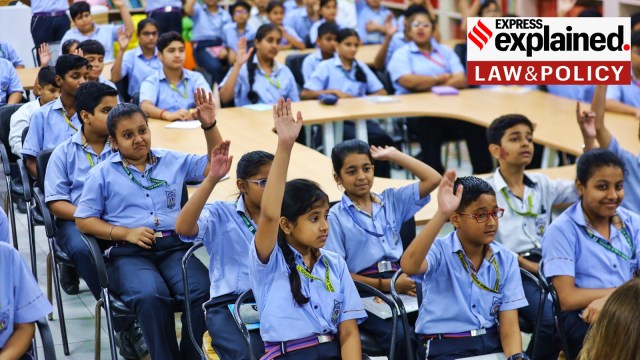Can Delhi’s unaided private schools increase fees without govt approval? What HC said
On April 29, the Delhi HC stayed a Delhi government circular from the Directorate of Education. The circular mandated that certain schools must seek its prior permission before raising fees. What was the court's rationale?
 Essentially, the court ruled that private unaided schools can increase fees without the DoE’s prior sanction “so long as they do not indulge in profiteering or commercialisation of education…” (Express photo by Abhinav Saha)
Essentially, the court ruled that private unaided schools can increase fees without the DoE’s prior sanction “so long as they do not indulge in profiteering or commercialisation of education…” (Express photo by Abhinav Saha)The Delhi High Court recently stayed a Delhi government circular, which said private unaided schools who were allotted land by government agencies needed prior sanction from the Directorate of Education (DoE) before increasing their fees for the academic year 2024-25.
A single-judge bench of Justice C. Hari Shankar also sought a response from the DoE on the plea filed by the Action Committee Unaided Recognised Private Schools, an organisation of such schools in Delhi. The next date of hearing is listed as July 31.
In staying the March 27 DoE circular, the court also relied on a Supreme Court ruling from 2004 and mentioned the need to prevent the “commercialisation of education”. Here’s what happened.
What exactly did the circular say?
On March 27, the Delhi government’s DoE said that “no private unaided school in Delhi which has been allotted land by the Govt. Agencies shall enhance fee without the prior sanction of the Director of Education.”
The circular relied on Section 17 of the Delhi School Education Act, 1973, which says that no “aided school” shall levy any fee, collect any other charge, or receive any other payment except those specified by the Director.
Here, an “aided school” means a recognised private school that receives aid in the form of a maintenance grant from the Centre or administrator, local authority, or any other authority designated by them. According to Section 2(g), “Director” refers to the Director of Education, Delhi, and includes any other officer authorised by him.
Section 17(2) also says that “every aided school” having different fee rates, other charges or different funds, has to seek prior approval from the authority before levying or collecting them.
Also, Section 17(3) requires managers of all recognised schools to, before each academic session, file “a full statement of the fees to be levied by such school during the ensuing academic session” with the director. Except with the director’s prior approval, such schools cannot charge any fee in excess to what is specified in the statement.
What the circular said on private unaided schools
The circular also called for the heads of private unaided schools to submit proposals to increase their fee for the academic session 2024-25. These schools, it said, were “allotted land by land-owning agencies on the condition of seeking prior sanction of (the) DoE for increasing fee”.
It further detailed the timeline and procedure for submitting proposals to the DoE and stated that the proposals will be scrutinised by the director through authorised officers or teams.
A school that doesn’t submit its proposal as prescribed cannot increase its fee, the circular said, adding that “schools are strictly directed not to increase any fee until the sanction is conveyed to their proposal by (the) DoE.”
Any complaint regarding fee increase without prior approval will be taken seriously and will make the school liable for action as per the statutory provisions, the circular stated.
Why did the Delhi HC stay this circular?
Through its interim order on April 29, the HC stayed the circular. The DoE now has four weeks to file its response. The stay order also notes that the “position which exists today”, following the HC’s 2019 order in a separate matter, is that unaided recognised private schools are not required to take DoE’s approval before increasing their fee.
Saying that respect for judicial pronouncements “is one of the pillars of the edifice of the rule of law”, the court also pulled up the DoE, saying the 2019 judgment had to be respected no matter “however dissatisfied” the DoE was with it.
“The attitude of the DoE in continuously issuing circulars threatening recognised unaided schools with action in the event of their increasing their fees without obtaining prior approval of the DoE is objectionable and cannot be allowed,” the court said.
Essentially, the court ruled that private unaided schools can increase fees without the DoE’s prior sanction “so long as they do not indulge in profiteering or commercialisation of education…” This principle was highlighted in the HC’s 2019 order, the HC said, while adding that the order is currently under challenge before a two-judge bench.
What was the Delhi HC’s 2019 ruling?
In Action Committee Unaided Recognised Private Schools vs. DoE, the HC was dealing with a legal challenge to the withdrawal of a 2017 circular. Through the DoE circular, unaided private schools could temporarily hike their fees to cater to the additional expenses, after the 7th Central Pay Commission required them to increase the salaries of their teachers and staff.
Later, the DoE prohibited private unaided schools functioning on government land from hiking tuition amounts without its approval. This is what was challenged in court – whether such schools needed prior approval to increase their fees. The court’s decision was referred to in the present case.
The court set aside the circular’s withdrawal on March 15, 2019, allowing private, unaided, and recognised schools to hike their fees without the DoE’s prior approval, irrespective of whether they were situated on land given at concessional rates by the government.
The court also relied on the Supreme Court’s 2004 ruling in Modern School vs. Union of India, where it held that a balance was required between maintaining institutions’ autonomy and preventing the commercialisation of education.
Saying that such commercialisation must be prevented, the court had said that unaided educational institutions enjoy “greater autonomy, in the matter of determination fee structure” and were “entitled to a reasonable surplus for development of education and expansion of the institution”.
- 01
- 02
- 03
- 04
- 05






































